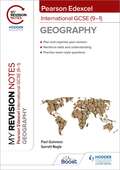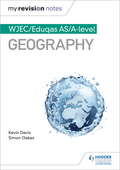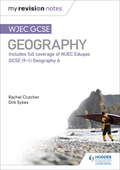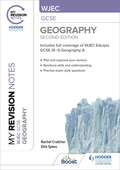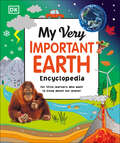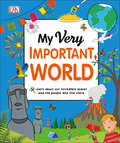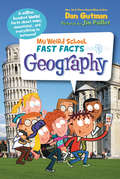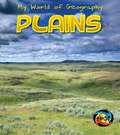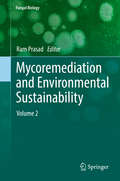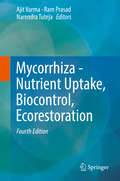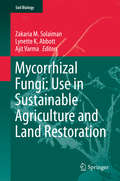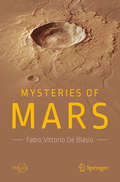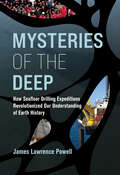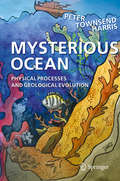- Table View
- List View
My Revision Notes: Pearson Edexcel International GCSE (9–1) Geography
by Garrett Nagle Paul GuinnessTarget success in Pearson Edexcel International GCSE (9-1) Geography with this proven formula for effective, structured revision.Key content coverage is combined with exam practice questions and practical tips to create a revision guide that students can rely on to review, strengthen and test their knowledge.With My Revision Notes every student can:- Plan and manage a successful revision programme using the topic-by-topic planner- Consolidate subject knowledge by working through clear and focused content coverage- Test understanding and identify areas for improvement with regular revision tasks- Improve exam technique through practice questions and tips- Learn and use key terms for each topic
My Revision Notes: Pearson Edexcel International GCSE (9–1) Geography
by Garrett Nagle Paul GuinnessTarget success in Pearson Edexcel International GCSE (9-1) Geography with this proven formula for effective, structured revision.Key content coverage is combined with exam practice questions and practical tips to create a revision guide that students can rely on to review, strengthen and test their knowledge.With My Revision Notes every student can:- Plan and manage a successful revision programme using the topic-by-topic planner- Consolidate subject knowledge by working through clear and focused content coverage- Test understanding and identify areas for improvement with regular revision tasks- Improve exam technique through practice questions and tips- Learn and use key terms for each topic
My Revision Notes: WJEC AS/A-level Geography (MRN)
by Kevin DavisExam board: WJEC and WJEC EduqasLevel: AS/A-levelSubject: GeographyFirst teaching: September 2016First exams: AS: Summer 2017, A-level: Summer 2018Target success in WJEC and WJEC Eduqas AS/A-level Geography with this proven formula for effective, structured revision.Key content coverage is combined with exam-style tasks and practical tips to create a revision guide that students can rely on to review, strengthen and test their knowledge.With My Revision Notes every student can:- Plan and manage a successful revision programme using the topic-by-topic planner- Consolidate subject knowledge by working through clear and focused content coverage- Test understanding and identify areas for improvement with regular 'Now Test Yourself' tasks and answers- Enhance exam responses using relevant examples and case studies for each topic- Improve exam technique through practice questions, expert tips and examples of typical mistakes to avoidThis revision guide covers the following topics:- Changing landscapes (Coastal landscapes; Glaciated landscapes)- Changing places- Global systems (Water and carbon cycles)- Global governance (Processes and patterns of global migration; Global governance of the Earth's oceans)- Contemporary themes in geography (Tectonic hazards)It also includes exam questions for 21st century challenges.This revision guide is suitable for the following specifications:- 2016 WJEC AS/A-level Geography specification regulated by Qualifications Wales- 2016 WJEC Eduqas AS/A-level Geography specification regulated by Ofqual
My Revision Notes: WJEC Eduqas GCSE (91) Geography B
by Stuart CurrieTarget success in WJEC Eduqas GCSE (9-1) Geography B with this proven formula for effective, structured revision; key content coverage is combined with exam-style tasks and practical tips to create a revision guide that students can rely on to review, strengthen and test their knowledge.With My Revision Notes every student can:- Plan and manage a successful revision programme using the topic-by-topic planner- Enjoy an active approach to revision with clear topic coverage and related 'Now Test Yourself' tasks and practical revision activities- Improve exam technique through useful advice and formal exam-style questions- Monitor their knowledge and progress using the answers provided for each 'Now Test Yourself' activity and exam-style question- Develop geographical understanding and enhance exam responses with event/place examples
My Revision Notes: WJEC GCSE Geography
by Dirk Sykes Rachel CrutcherExam Board: WJEC Level: GCSE Subject: Geography First Teaching: September 2016 First Exam: Summer 2018Target success in WJEC/WJEC Eduqas A GCSE Geography with this proven formula for effective, structured revision; key content coverage is combined with exam-style tasks and practical tips to create a revision guide that students can rely on to review, strengthen and test their knowledge.With My Revision Notes every student can:- Plan and manage a successful revision programme using the topic-by-topic planner- Enjoy an active approach to revision with clear topic coverage and related 'Now Test Yourself' tasks and practical revision activities- Improve exam technique through exam tips and formal exam-style questions- Monitor their knowledge and progress using the answers provided for each 'Now Test Yourself' activity and exam-style question- Develop geographical understanding and enhance exam responses with event/place examples This book covers the content of:- 2016 WJEC GCSE (A*-G) Geography specification regulated by Qualifications Wales- 2016 WJEC Eduqas GCSE (9-1) Geography A specification regulated by Ofqual
My Revision Notes: WJEC GCSE Geography Second Edition
by Dirk Sykes Rachel CrutcherTarget exam success with My Revision Notes. Our updated approach to revisionwill help students learn, practise and apply their skills and understanding. Coverage ofkey content is combined with practical study tips and effective revision strategiesto create a guide that can be relied on to build both knowledge and confidence.My Revision Notes: WJEC GCSE Geography will help students:- Plan and manage revision with our topic-by-topic planner and exam breakdown introduction- Practise and apply skills and knowledge with Exam-style questions and frequent check yourunderstanding questions, and answer guidance online- Build quick recall with bullet- pointed summaries at the end of each chapter- Understand key terms for the exam with user-friendly definitions and a glossary- Avoid common mistakes and enhance exam answers with Examiner tips- Improve subject-specific skills with an Exam skills checkbox at the end of each chapter
My Revision Notes: WJEC GCSE Geography Second Edition
by Dirk Sykes Rachel CrutcherTarget exam success with My Revision Notes. Our updated approach to revisionwill help students learn, practise and apply their skills and understanding. Coverage ofkey content is combined with practical study tips and effective revision strategiesto create a guide that can be relied on to build both knowledge and confidence.My Revision Notes: WJEC GCSE Geography will help students:- Plan and manage revision with our topic-by-topic planner and exam breakdown introduction- Practise and apply skills and knowledge with Exam-style questions and frequent check yourunderstanding questions, and answer guidance online- Build quick recall with bullet- pointed summaries at the end of each chapter- Understand key terms for the exam with user-friendly definitions and a glossary- Avoid common mistakes and enhance exam answers with Examiner tips- Improve subject-specific skills with an Exam skills checkbox at the end of each chapter
My Revision Notes: WJEC/Eduqas AS/A-level Geography
by Kevin DavisExam board: WJEC and WJEC EduqasLevel: AS/A-levelSubject: GeographyFirst teaching: September 2016First exams: AS: Summer 2017, A-level: Summer 2018Target success in WJEC and WJEC Eduqas AS/A-level Geography with this proven formula for effective, structured revision.Key content coverage is combined with exam-style tasks and practical tips to create a revision guide that students can rely on to review, strengthen and test their knowledge.With My Revision Notes every student can:- Plan and manage a successful revision programme using the topic-by-topic planner- Consolidate subject knowledge by working through clear and focused content coverage- Test understanding and identify areas for improvement with regular 'Now Test Yourself' tasks and answers- Enhance exam responses using relevant examples and case studies for each topic- Improve exam technique through practice questions, expert tips and examples of typical mistakes to avoidThis revision guide covers the following topics:- Changing landscapes (Coastal landscapes; Glaciated landscapes)- Changing places- Global systems (Water and carbon cycles)- Global governance (Processes and patterns of global migration; Global governance of the Earth's oceans)- Contemporary themes in geography (Tectonic hazards)It also includes exam questions for 21st century challenges.This revision guide is suitable for the following specifications:- 2016 WJEC AS/A-level Geography specification regulated by Qualifications Wales- 2016 WJEC Eduqas AS/A-level Geography specification regulated by Ofqual
My River: Cleaning up the LaHave River
by Stella BowlesStella Bowles was in sixth grade when she became an environmental activist to campaign against sewage draining into the LaHave River. In this book, she tells the inspirational story of how her science fair project caught the eyes of the media, the public and government leaders, propelling her into the limelight. Stella's two and a half year fight resulted in raising $15.7 million to clean up the river and numerous awards for environmental activism. Today she continues to campaign for cleaner water and teaches other children how to test water quality in their own backyards and how to take action if it is polluted. Stella's story will motivate readers to engage in local environmental activism and demonstrates that doing what's right has no age barriers.
My Very Important Earth Encyclopedia: For Little Learners Who Want to Know Our Planet (My Very Important Encyclopedias)
by DKA charming children's encyclopedia bursting with facts about explosive volcanoes, incredible habitats, and world-saving ideas.The world is so much bigger than young minds can fathom and there is always more to learn. My Very Important Earth is a vibrant encyclopedia for curious 5-9 year olds, with a unique approach to the subject that features both places from around the globe as well as focusing on what the world is like from a child&’s perspective, covering everyday subjects about their own experiences. Full of fun facts, colourful illustrations, and games that will keep the kids entertained time again, this children&’s encyclopedia is filled with age-appropriate knowledge on a range of topics from Earth&’s inner core to the thinnest air at the edge of the atmosphere, get ready for a round-the-world adventure! Dig down and learn exactly what is under our feet. Investigate the workings of earthquakes and volcanoes. Learn howmountains are made and how rivers form. Find out about wind, rain, and extreme weather on Earth&’s surface. Explore Earth&’s habitats, and meet the plants and animals that call them home. Finally, find out about how our planet is under threat, and what you can do to protect it.Celebrate your child&’s curiosity as they:- Read hundreds of exciting facts- Learn all about geology, habitats, conservaton- Discover the wonders of our incredible planet, and moreOur encyclopedia for children is the perfect blend of adorable, simple illustrations with stunning photography and lively text. Encourage early learners to go on a journey to explore a world of information, making this the ideal first reference book for kids aged 5-9 to enjoy for hours on end, whether for homeschooling, a bedtime story, shared reading or reading alone, this fun fact book for children also doubles up as the perfect gift for curious kids who love to learn. Tell the story of the world one page at a time, by uncovering: - Educational content written in a friendly and fun manner - Beautifully padded cover with several high-quality finishes, including padding and foil- Features a built-in ribbon bookmark so you never lose your place whilst reading More in the SeriesMy Very Important Earth is part of the educational kid&’s book series My Very Encyclopedia series. Complete the series and nurture your child's curiosity with My Encyclopedia of Very Important Adventures, teach them about different species with My Encyclopedia of Very Important Animals, or let them walk with the dinosaurs who ruled the earth before them in My Encyclopedia of Very Important Dinosaurs.
My Very Important World: For Little Learners who want to Know about the World (My Very Important Encyclopedias)
by DKA charming children's encyclopedia bursting with fun facts for little learners who want to know about the world!Our world is an amazing place. It&’s full of rivers, mountains, animals, and too many other amazing places to count. But that&’s not all. There&’s also families, friends, music, technology, language, games, and all other things that make lifewonderful. This exciting children&’s book is a celebration of our world and what it&’s like to live in it. My Very Important World is a vibrant encyclopedia for curious 5-9 year olds, with a unique approach to the subject that features both places from around the globe as well as focusing on what the world is like from a child&’s perspective, covering everyday subjects about their own experiences. Unlike an atlas, this encyclopedia of discovery will entertain, educate, and inspire readers to wonder about the world around them. On one page they&’ll read about their body and brain, on another they&’ll learn about languages, food, culture, the environment, and on others, they can marvel at wonders of the Earth such as fiery volcanoes, sprawling cities, or a place called &“The Rainbow Mountains&”. My Very Important World allows readers to delight in discovering where the coldest place on Earth is, how many languages there are, why they sometimes feel scared, and much more. Full of fun facts, colorful illustrations, and games that will keep the kids entertained time again, this children&’s encyclopedia is filled with age-appropriate knowledge on a range of terrific topics, with contents divided into six sections, covering: My World, The World Around Me, People and Culture, The Big Wide World, The Natural World, and Exploring The World.Celebrate your child&’s curiosity as they:- Read hundreds of exciting facts- Learn all about amazing animals, people, and places- Discover the wonders of our incredible planet, and moreOur encyclopedia for children is the perfect blend of adorable, simple illustrations with stunning photography and lively text. Encourage early learners to go on a journey to explore a world of information, making this the ideal first reference book for kids aged 5-9 to enjoy for hours on end, whether for homeschooling, a bedtime story, shared reading or reading alone, this fun fact book for children also doubles up as the perfect gift for curious kids who love to learn. Tell the story of the world one page at a time, by uncovering: - Educational content written in a friendly and fun manner - Beautifully padded cover with several high-quality finishes, including padding and foil- Features a built-in ribbon bookmark so you never lose your place whilst reading More in the SeriesMy Very Important World is part of the educational kid&’s book series My Very Encyclopedia series. Complete the series and nurture your child's curiosity with My Encyclopedia of Very Important Adventures, teach them about different species with My Encyclopedia of Very Important Animals, or let them walk with the dinosaurs who ruled the earth before them in My Encyclopedia of Very Important Dinosaurs.
My Weird School Fast Facts: Geography (My Weird School Fast Facts)
by Dan Gutman Jim PaillotThink fast with A.J. and Andrea from My Weird School!Did you know that Antarctica's largest land animal is an insect? Did you know that the smallest country in the world is only 0.2 square miles?!Learn more weird-but-true geography facts with A.J. and Andrea from Dan Gutman's bestselling My Weird School series. This all-new series of nonfiction books features hundreds of hysterical facts, plus lots of photos and illustrations.Whether you're a kid who wants to learn more about geography or simply someone who wants to know if there's really a town called Scratch Ankle, this geography facts edition is the book for you.With more than 9.5 million books sold, the My Weird School series really gets kids reading!
My World Interactive, World Geography, Student Textbook, Grade 6-8 Michigan Edition
by Gregory H. Chu Don HoltgrieveMy World Interactive, World Geography, Student Textbook, Grade 6-8 Michigan Edition
My World Interactive, World Geography, Student Textbook, Grades 6-8, Michigan Edition
by Gregory H. Chu Don HoltgrieveMy World Interactive, World Geography, Student Textbook, Grades 6-8, Michigan Edition
My World of Geography: Plains
by Patricia WhitehouseThis book talks about different types of plains around the world, their attributes and special features.
Mycelial Mayhem: Growing Mushrooms for Fun, Profit and Companion Planting
by Kristin Sewak David Sewak“A comprehensive and personal tome on the production, business, promotion, and problem solving for the independent mushroom grower.” —Taylor Lockwood, renowned mushroom expert & photographerMost supermarket mushrooms are bland and boring; products of an industrial process which typically relies on expensive equipment and harmful pesticides. Many people would like to add more flavorful and diverse fungi to their diets, but lack the knowledge or confidence to gather or grow their own. Do-it-yourself cultivation is a fun, exciting way to incorporate a variety of mushrooms into a sustainable lifestyle.Mycelial Mayhem is a straightforward, no-nonsense resource for the aspiring mushroom grower. This practical guide cuts through much of the confusion surrounding methods and techniques, helping the hobbyist or farmer to:Select regionally appropriate species for the home garden, farm-scale production, or an edible landscapePractice sustainable, environmentally friendly cultivation techniques, such as companion planting, to combat common garden pests and diseasesChoose a successful, proven business approach to maximize profit and minimize frustrationMany people find that DIY mushroom cultivation is not nearly as complicated as they expect, but a knowledgeable and experienced mentor is crucial to success. Whether your goal is to harvest homegrown gourmet mushrooms for your table, supplement your income by selling to friends and neighbors, or start a full-fledged niche business, Mycelial Mayhem is packed with the advice and resources you need to succeed with this rewarding and valuable crop.“After reading Mycelial Mayhem’s approachable primer to this age-old art I’m ready to invite the mysterious and captivating kingdom of fungi right into my own home.” —Langdon Cook, author of The Mushroom Hunters
Mycoremediation and Environmental Sustainability: Volume 2 (Fungal Biology)
by Ram PrasadBioremediation is the use of microorganisms' metabolism to degrade waste contaminants (sewage, domestic, and industrial effluents) into non-toxic or less toxic materials by natural biological processes. Volume 2 offers new discussion of remediation through fungi—or mycoremediation—and its multifarious possibilities in applied remediation engineering and the future of environmental sustainability. Fungi have the biochemical and ecological capability to degrade environmental organic chemicals and to decrease the risk associated with metals, semi-metals, noble metals, and radionuclides, either by chemical modification or by manipulating chemical bioavailability. Additional expanded texts shows the capability of these fungi to form extended mycelia networks, the low specificity of their catabolic enzymes, and their use against pollutants as a growth substrate, making these fungi well suited for bioremediation processes. Their mycelia exhibit the robustness of adapting to highly limiting environmental conditions often experienced in the presence of persistent pollutants, which makes them more useful compared to other microbes. Despite dominating the living biomass in soil and being abundant in aquatic ecosystems, however, fungi have not been exploited for the bioremediation of such environments until this added Volume 2. This book covers the various types of fungi and associated fungal processes used to clean up waste and wastewaters in contaminated environments and discusses future potential applications.
Mycorrhiza - Nutrient Uptake, Biocontrol, Ecorestoration
by Narendra Tuteja Ajit Varma Ram PrasadThis is the fourth updated and revised edition of a well-received book that emphasises on fungal diversity, plant productivity and sustainability. It contains new chapters written by leading experts in the field. This book is an up-to-date overview of current progress in mycorrhiza and association with plant productivity and environmental sustainability. The result is a must hands-on guide, ideally suited for agri-biotechnology, soil biology, fungal biology including mycorrrhiza and stress management, academia and researchers. The topic of this book is particularly relevant to researchers involved in mycorrhiza, especially to food security, plant microbe interaction and environmental protection. Mycorrhizas are symbioses between fungi and the roots of higher plants. As more than 90% of all known species of plants have the potential to form mycorrhizal associations, the productivity and species composition and the diversity of natural ecosystems are frequently dependent upon the presence and activity of mycorrhizas. The biotechnological application of mycorrhizas is expected to promote the production of food while maintaining ecologically and economically sustainable production systems.
Mycorrhizal Fungi: Use in Sustainable Agriculture and Land Restoration
by Ajit Varma Zakaria M. Solaiman Lynette K. AbbottThis volume explores the various functions and potential applications of mycorrhizas, including topics such as the dynamics of root colonization, soil carbon sequestration and the function of mycorrhizas in extreme environments. Some contributions focus on the use of arbuscular mycorrhizal fungi in various crop production processes, including soil management practices, their use as biofertilizers and in relation to medicinal plants. Other chapters elucidate the role of arbuscular mycorrhizal fungi in the alleviation of plant water stress and of heavy metal toxicity, in the remediation of saline soils, in mining-site rehabilitation and in the reforestation of degraded tropical forests. In addition to their impact in ecosystems, the economic benefits of applying arbuscular mycorrhizal fungi are discussed. A final chapter describes recent advances in the cultivation of edible mycorrhizal mushrooms.
Mycorrhizosphere and Pedogenesis
by Ajit Varma Devendra K. ChoudharyThe present book highlights importance of mycorrhiza in soil genesis wherein it reflects mycorrhizal occurrence and diversity, various tools to characterize them and its impact on soil formation/health together with crop productivity. The edited compendium provides glimpses on the mycorrhizal fungi and their prominent role in nutrient transfer into host plants, and presenting view on application of mycorrhiza for crop biofortification. It focuses on the mechanisms involve in weathering process employed by mycorrhiza with highlighting the current and advanced molecular approaches for studying mycorrhizal diversity. Further, book emphasizes following aspects in details: significance of AMF in phytoremediation of hydrocarbon contaminated sites, the role of mycorrhiza in soil genesis using scientometric approach, the concept of mycorrhizosphere, xenobiotic metabolism, molecular approaches for detoxifying the organic xenobiotics and the role of mycorrhizosphere in stabilizing the environment in an eco-friendly way. In addition, the book will be benign to researchers that involved in mycorrhiza characterization especially by deploying metagenomics/PCR based and non PCR based molecular techniques that may be utilized to study the microbial diversity and structure within the mycorrhizosphere.
Myself and Other Animals: A posthumous work from the beloved conservationist to celebrate the centenary of his birth
by Gerald DurrellA posthumous work from the beloved conservationist and naturalist Gerald Durrell, to celebrate the centenary of his birth, with a new foreword by HRH Princess Anne.‘Gerald Durrell was magic’ SIR DAVID ATTENBOROUGH ‘A wise, genial and world-encompassing book’ SUNDAY TIMES ‘Fills important gaps in the biographical narrative . . . Truly, there is magic here’ GUARDIAN Myself and Other Animals is a new book mosaicked from unpublished autobiographies, uncollected pieces and previously published extracts from Durrell’s work and archives. The result is an extraordinary journey through Durrell’s life in his own words, edited and introduced by his widow Lee Durrell.Drawing on a memoir that Durrell started writing before he became too ill to continue it, and an unfinished book from a trip to Australia in 1969 to the Great Barrier Reef, Northern Territory and Queensland, here is the unvarnished story of Durrell’s life, from touching family tributes to golden bats and pink pigeons.Moving from India to England and then to the always sun-lit Corfu, told with dry wit and insight into our fellow animals, here is the vivid finale of one of Britain’s most beloved conservationists and prose stylists.'Funny and readable and hugely charming' i ‘One of the finest and most lyrical nature writers in English’ OBSERVER'A moving tribute to Gerald's endeavours and achievements as a conservationist' SPECTATOR
Mysteries of Mars (Springer Praxis Books)
by Fabio Vittorio De BlasioThis book introduces the reader to the wonders of Mars, covering all aspects from our past perceptions of the planet through to the latest knowledge on its history, its surface processes such as impact cratering, volcano formation, and glaciation, and its atmosphere and climate. In addition, a series of ten intriguing open issues are considered in a more advanced way. These include such thought-provoking questions as What turned off the planet’s magnetic field?, Why are the northern and southern hemispheres so different?, What was the fate of the once abundant water?, and Is there, or was there, life on Mars? Numerous original figures, unavailable elsewhere, reproduce details of images from Viking, CTX, MOC, HiRISE, THEMIS, and HRSC. The book will appeal especially to general readers interested in planetary sciences, astronomy, astrogeology, and space exploration and to students of Earth Sciences and Natural and Environmental Sciences. The higher-level material on the remaining mysteries of Mars will also be of interest to astrogeologists and other researchers.
Mysteries of the Deep: How Seafloor Drilling Expeditions Revolutionized Our Understanding of Earth History
by James Lawrence PowellA groundbreaking chronicle of scientific ocean drilling—a crowning achievement of the twentieth century—and how it shaped our knowledge of Earth's past.Under the radar—or, rather, sonar—of most people and many scientists, for the last six decades ships have plied the world&’s oceans, mining the seafloor for its secrets—and quietly resolving confounding geological mysteries. Continental drift and plate tectonics. The origin of the Hawaiʻian Islands. The erstwhile disappearance of the Mediterranean. The mystery of the ice ages. All are part of the story told by deep-sea drilling—and chapters in the history that unfolds in Mysteries of the Deep. In a series of vignettes ranging from the voyage of the HMS Challenger in the 1870s to the adventures of research ship Chikyū in the 2020s, James Powell recounts the surprises the seafloor has yielded to the probing of scientists.With a global, sometimes even extraterrestrial scope and a scientific reach that extends to every corner of geology and astrobiology, Powell&’s work recounts how cores extracted from the ocean floor have:· produced insights into microbial life on Mars and the end of dinosaurs&’ tenure on Earth· demonstrated that astronomical cycles control many geological events, and even human evolution· used a past episode of global warming to reveal the peril of high temperatures today· shown that global warming could melt enough Antarctic ice to drown the seacoastsThe mysteries uncovered by deep-sea drilling, and covered by Powell in this eye-opening book, are many and various, often surprising and sometimes alarming—consequential not just for the science of the seafloor, but for how we learn about our planet's past and what we can do about its future.
Mysteries of the Round Towers: The Subtle Energies of the Stone Structures of Ireland
by Christopher Freeland• Reveals how the round towers were built over the crossing of underground waterways and with every stone in magnetic polarity alignment• Explains how the siting and magnetic properties of the towers energetically enhances the surrounding environment, akin to feng shui and vastu• Presents a guide to the energetic principles behind the creation and purpose of the round towersIn Ireland, and to a lesser extent Scotland, in seemingly unconnected locations, there are more than 60 enigmatic round towers, often 90 feet tall or higher and nearly uniform in their construction. Believed to have been built between the 7th and 10th centuries CE, the Roman Catholic Church long ago laid claim to them. Yet who built them—and why—is completely unknown, and even their date of construction is debatable.Presenting a professional dowser&’s radiesthetic and magnetic analysis of the round towers of Ireland, Christopher Freeland examines previously unexplored yet fundamental facts common to all of the round towers, including geographic orientation, connections to underground waterways, historical records, and the magnetic polarity of the stones themselves. Explaining the basics of radiesthesia, the energetic science of dowsing, the author shows how the locations of the towers have far-reaching ramifications for the health of humans, animals, and plants in their surrounding areas. His in-person examinations reveal how systematic magnetic orientation of the stones in these towers&’ walls, the unusual construction techniques of the unknown architects, and the resulting access to Earth&’s telluric forces further enhance their energetic effects. He explores the types of stone used, speculates how many towers once existed, and firmly debunks the assertion that they were built by the Church.Offering a guide to the creation and purpose of the round towers, Freeland shows that we can once again embrace the ancient wisdom of our ancestors about the flow of energy in the Earth and bring back balance and harmony through understanding Nature&’s alchemy of stone, water, and magnetism.
Mysterious Ocean: Physical Processes and Geological Evolution (Springer Oceanography Ser.)
by Peter Townsend HarrisThis book provides an introduction to ocean sciences that is engaging, evocative and accessible to non-experts interested in marine geoscience, while sparking readers' interest in important unsolved mysteries in marine science. The scope of the book is quite broad, but focuses on the physical ocean and its geological evolution, including the author's experiences working as an oceanographer over the last thirty years. Across ten chapters, the book traces the origins of the ocean from its formation 4 billion years ago, reviews the discoveries of the theory of plate tectonics, the ice ages and the great ocean conveyor, and discusses seafloor features (canyons, seamounts, trenches, abyssal plains, etc.), how they formed and their current environmental issues. The book concludes with a prognosis for the future ocean we might expect with global climate change and other human impacts.
